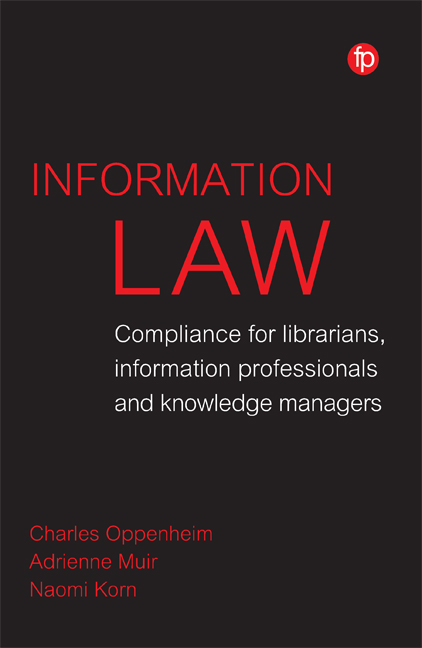Book contents
- Frontamtter
- Contents
- List of Acronyms
- List of Figures and Tables
- List of Case Studies
- Introduction
- 1 Copyright and Related Rights
- 2 Data Protection
- 3 Freedom of Information
- 4 Governance, Audits and Risk Assessment
- 5 Policies
- 6 Procedures: Copyright and Related Rights
- 7 Procedures: Using and Negotiating Licences for Access to Information Resources
- 8 Procedures: Data Protection and Freedom of Information
- 9 Tools and Templates
- 10 Awareness and Engagement
- 11 Some Speculations About the Future
- Appendix 1 Carrying out an Information Asset Audit
- Appendix 2 Sample IP Policy
- Appendix 3 Sample Data Protection Policy
- Appendix 4 Possible Contractual Terms for Online Access to Database Service
- Appendix 5 Data Protection Privacy Notice Template
- Bibliography
- Index
7 - Procedures: Using and Negotiating Licences for Access to Information Resources
Published online by Cambridge University Press: 29 July 2020
- Frontamtter
- Contents
- List of Acronyms
- List of Figures and Tables
- List of Case Studies
- Introduction
- 1 Copyright and Related Rights
- 2 Data Protection
- 3 Freedom of Information
- 4 Governance, Audits and Risk Assessment
- 5 Policies
- 6 Procedures: Copyright and Related Rights
- 7 Procedures: Using and Negotiating Licences for Access to Information Resources
- 8 Procedures: Data Protection and Freedom of Information
- 9 Tools and Templates
- 10 Awareness and Engagement
- 11 Some Speculations About the Future
- Appendix 1 Carrying out an Information Asset Audit
- Appendix 2 Sample IP Policy
- Appendix 3 Sample Data Protection Policy
- Appendix 4 Possible Contractual Terms for Online Access to Database Service
- Appendix 5 Data Protection Privacy Notice Template
- Bibliography
- Index
Summary
Introduction
Whether you are providing access and usage rights to information resources (digital, print, and/or any other media or format) in which you own the rights (licensing out) or signing licences with organisations that are offering to supply electronic information to your institution (licensing in), negotiating the right terms will be extremely important. Contract management is an essential component of copyright compliance, an area of responsibility that has grown rapidly in recent years, and arguably one cannot do one's job as a manager of an electronic information service without getting involved in these crucial information law issues. Even if you work for an institution that has in-house lawyers, few, if any of them will have any experience of contractual terms within the context of LIK services, and specifically of contracts relating to access to information resources and/or information management issues. This chapter is written largely from the point of view of someone who is thinking of buying in from a third party offering a licence. If you are proposing to license out the use of resources that your institution holds the rights to, think of this chapter as identifying the issues you will have to address to satisfy potential clients of your services.
The electronic information industry
The electronic information industry (which term includes those selling – or offering for free – information over the web as well as through other electronic media) is a particularly complex industry. This is in terms of the players who are involved, the many relationships that are possible between these players, as well as the inevitability that the players will take on multiple roles in the supply chain of resources, depending upon your relationship to the information resources themselves. This complexity is one (but by no means the only) reason why it is so difficult to measure the size or growth rate of the industry. Who, then, are the players involved in the industry?
The first player in the electronic information industry is the information provider, also known as the database producer or similar terms. This is an individual or organisation that creates information, which is offered directly to end-users or which is licensed to other organisations (often called aggregators) who allow users access to them. Information providers can be, but are not always, also publishers in media other than electronic, e.g. print.
- Type
- Chapter
- Information
- Information LawCompliance for Librarians, Information Professionals and Knowledge Managers, pp. 93 - 106Publisher: FacetPrint publication year: 2020



